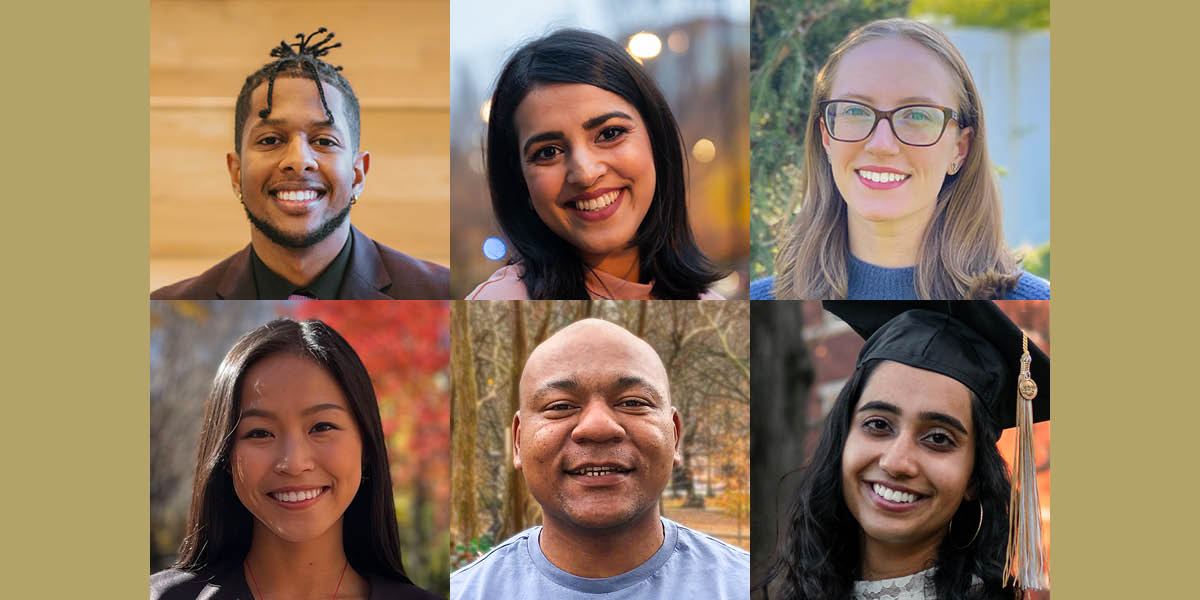Jackie Tu, B.S. AE '21
What is your next adventure?
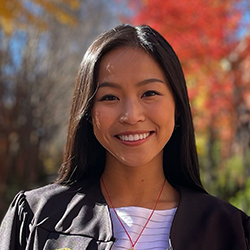 |
| Jackie Tu, BSAE '21 |
At the end of January next year, I will be working full-time with Lockheed Martin as an aeronautical associate in Marietta, Georgia. Specifically, I'll be working in the structures division as a durability and damage tolerance analysis engineer, so I’ll get to work on projects involving analyzing crack growth and performing fatigue analysis for Lockheed’s aircraft.
What about your next adventure are you most looking forward to?
I’m looking forward to hopefully getting to work in Skunk Works because that's been a dream of mine since coming to Georgia Tech. Skunk Works is Lockheed’s Advanced Development Program that developed the SR-71 Blackbird, F-22 Raptor, F-35 Lightning, and so many others as well. Having the opportunity to work on developing new aircraft is super exciting to me and I’m especially excited because Skunk Works used to only be in Palmdale, California but now they're branching out to Georgia.
Did you have any previous co-op, internship, or research experience in this area?
During my first year at Tech, I did research with Prof. Brian German working on electric vertical take-off and landing (eVTOL) aircraft which sparked my interest in aerospace, especially airplanes. I liked the hands-on aspect because in high school I didn’t have exposure to any engineering classes, so it was nice to get to physically build planes and see things come to life.
Then, that following summer, I interned as a design reconfiguration engineering for HAECO Americas. I worked on HAECO’s interior aircraft section which focused on designing seats, overhead bins, galleys, etc. for various airline customers. There I got exposure to both cad and systems engineering. I got to rewrite their engineering design process standard operating procedure while also working on updating drawings and parts in SolidWorks.
Then, the summer after sophomore year I started my co-op with Delta Air Lines as an Airbus structures co-op within their fleet engineering department. I ended up spending four rotations or four semesters for a total of two-and-a-half years at Delta. The team I worked on created projects that help to maintain and inspect all of Delta's Airbus planes from a structural standpoint. That experience was cool to me because I got to work on the operations side of aerospace and see the big picture of the business. It was really motivating to know that what I was doing was helping to connect people around the world and keeping them safe while flying.
Then, in the summer of 2020, I interned with Lockheed Martin where I worked as a durability and damage tolerance analysis intern, specifically on the C-130 and C-5 aircraft. My project was to determine how close in proximity would you place two skin patch repairs in order to prevent high stress fields from forming on the fuselage of a C-5. I ran a lot of simulations with finite element analysis and got to learn about the theories and concepts behind FEA which is something that is usually not taught until you're in grad school, so it was nice to gain exposure to that in my undergrad.
Finally, I interned at Blue Origin this past summer as an integrated test operations intern on the New Glenn business unit. I got to work on analyzing thermodynamics and fluid mechanics of pressure tanks which was completely different than anything I’ve done previously. All of my other internships were focused on structures of fixed wing aircraft; however, I was sad at the idea that I would leave Georgia Tech with an aerospace engineering degree without ever experiencing working in the space industry, so I really wanted to try it out and it was probably one of the best decisions I’ve made. I fulfilled my desire to work on rockets and also got to intern with three other GT AE female students.
How did your educational experience at Georgia Tech help you to achieve your goals?
.I think being at Georgia Tech allowed me to be exposed to so many new things. I’m from Dublin, Ohio which is a pretty small town compared to Atlanta. I didn’t go to a STEM high school, so I didn't really know much about engineering, but I knew I really liked physics and I really liked airplanes, so I knew that’s what I ultimately wanted to study. (Shoutout to my high school physics teacher Mr. Scott for helping me find my love for physics and my drive for understanding how the world works). Once I got to Tech and began taking classes and getting acclimated to campus, I could tell that it didn’t matter which engineering major you chose, there are endless possibilities available here. That really pushed me to take advantage of every opportunity I had, whether that was working hard in my classes to pursuing internships and co-ops to joining organizations I am passionate about like Society of Women Engineers (SWE) or School of Aerospace Engineering Student Advisory Council (SAESAC) or Sigma Gamma Tau (SGT). I think Georgia Tech really let me thrive and become the best version of myself.
What advice would you give to an underclassman who would like to follow the same path?
Be your own biggest supporter and advocate for yourself. Aerospace engineering is really tough, but that shouldn't scare you because it is 100% worth pursuing. It’s one of the coolest and most innovative majors out there, and there are no limits of what you can pursue in aerospace. You can make whatever you want to do work once you have this degree.
It takes a lot to get through the program, but it speaks volumes about the people who can make it through, so set your goals high, work hard, and believe in your abilities. You got this!
Darryl Williams, B.S. AE '21
What is your next adventure?
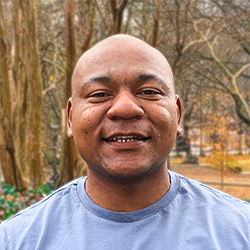 |
| Darryl Williams, B.S. AE '21 |
My next adventure is I’ll be pursuing a Ph.D. candidacy at the University of Minnesota. I’m not sure exactly what I’ll be doing, but I’ll be researching computationally, high speed flows. Most likely my research assistantship (RA) will be to make significant contributions to a Multidisciplinary University Research Initiative (MURI), involving mathematical foundations for enabling robust optimal design of hypersonic systems
What about your next adventure are you most looking forward to?
I’m really excited to see a new part of the country. I’ve never been to Minneapolis, Minnesota so I’m looking forward to that. I grew up in Georgia, so I’m excited to venture off to a new place and also see where else I can contribute.
Did you have any previous co-op, internship, or research experience in this area?
I had a co-op with ATA Engineering where I did finite element analysis, which later transitioned to computational fluid dynamics (CFD). After that experience I interned at the Georgia Tech Research Institute (GTRI) where I did Thermo-Structural modeling of ceramic matrix composite or (CMCs) looking at crack propagation under high thermal loads.
My most recent internship was at MIT Lincoln Laboratories where I worked on a blend of aerospace and computer science-based research on a hypersonics project.
During my time at Tech, I did undergraduate research with the Aerospace Systems Design Lab (ASDL), where I worked on a project to create a multidisciplinary optimization toolkit to aid in hypersonic vehicle design. It was an eye-opening experience in terms of looking at a system and determining how do you actually design a hypersonic vehicle which was really interesting and opened up a lot of opportunities for me.
Recently, I’ve been working in the Ben T. Combustion Lab where I’ve been conducting CFD research. Most recently, aiding in generating meshes for fundamental research involving jet in cross flow simulations with research engineers Vishal Srinivas Acharya and Vedanth Nair.
How did your educational experience at Georgia Tech help you to achieve your goals?
The name brand of Georgia Tech has helped me tremendously. I’ve been awarded several scholarships and internship positions partly because of how well-known Georgia Tech is in the field of engineering and the number of employers that specifically seek Tech students. The relationships and partnerships that Tech is involved in really does matter.
It propels you ahead of the pack in terms of opportunities to network with individuals. It almost makes me scared to leave Tech because of the network, but it’s the right move right now to expand my network and venture off to work with a new group of engineers.
What advice would you give to an underclassman who would like to follow the same path?
I’ll speak from the heart, but first I’ll say take advantage of speaking with your professors and attending their office hours. They’re a knowledge bank that you should tap into and they’re here to help guide you.
Now from the heart, always be inquisitive and curious. Those are invaluable traits for a future scientist and engineer. Whether you’re at the workplace or in class, ask questions.
Push yourself, I would not be the person I am today if I hadn’t applied myself to different fields that I was uncertain of or investing in projects that I probably had no business being in because I had little to no experience, but I learned and grew my technical knowledge because of it.
Maintain your confidence. I would compare myself to individuals who had decades of experience in the field which led me to question my ability because I was always comparing myself to them. I feel something very important to keep in mind is that you're still young, and you're still learning. Some of those people have had decades to perfect the craft and they made mistakes along the way. So, don’t lose your confidence in failing at something! Make sure to have a healthy amount of confidence.
Saumya Sharma, B.S. AE '21
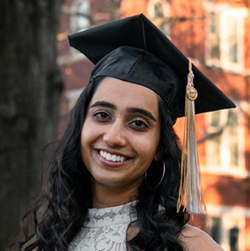 |
| Saumya Sharma, B.S. AE '21 |
What is your next adventure?
I plan to take the spring semester off so that I can go back home to New Jersey and reconnect with my family, especially my little brother. When I left home for Georgia Tech, he was in the 6th grade and now he’s in 10th grade, so I’ve missed a lot of his childhood and am looking forward to catching up with him. I am also working part-time next semester at REI, which is super exciting since I can use my job to help fund traveling within the US as I get ready to start graduate school in the fall of 2022.
In the summer, I hope to intern with another commercial aerospace company. I’m currently interviewing with a few companies, so I should find out soon if any of those pan out. My goal is to find an internship that will shape specifically what kind of research I want to do in graduate school.
What about your next adventure are you most looking forward to?
I'm really looking forward to getting the chance to intern at another aerospace company and immerse myself in their fast-paced environment. In undergrad, some of the craziest memories I have were at my internships – from seeing Astranis putting together the initial mockup of their satellite to being front and center of the Demo-2 launch. On a more wholesome note, I’m also looking forward to reconnecting with my family and exploring different places in the states and getting back into surfing.
Did you have any previous co-op, internship, or research experience in this area?
During my first year at Tech, I interned at the MIT Lincoln Lab as a mechanical engineering intern. While I was there, I got my first glimpse of what it was like to work at a research institute. I focused on initial trade studies and design of the exterior structure of a small satellite and was introduced to presenting to people in the industry.
The following summer, I received a Brooke Owens Fellowship which matched me with Astranis Space Technologies. There I worked as a mechanical engineering intern, designing the initial ground support equipment for their GeoSat-1 satellite, which will provide internet service for Alaska in geostationary orbit. It was really neat to learn about Astranis’ overall mission plan and mission trajectory. I think that's where I got the inkling that (while I did find structures in mechanical engineering really cool) I wanted to pivot towards guidance, navigation, and controls (GNC), but I didn't really know what that meant as a sophomore.
Then the next co-op I had was with SpaceX between January 2020, and July 2020, smack in the middle of like the pandemic, working on the Dragon Final Integration team at the Cape. My internship began with the inflight abort test (IFA) and eventually transitioned into me actively contributing to the final Dragon-1 cargo mission (CRS-21) and the first crewed Dragon-2 mission (Demo-2). I was front and center with my team, prepping for the Demo-2 mission, which was slated to be the first crewed mission to return America back to the International Space Station on an American launch vehicle. It was a really humbling moment to see history being made in front of me, and to have the sheer opportunity to work on the Dragon vehicle that sent astronauts Bob Behnken and Doug Hurley into space. During my time there I worked on operations that directly impacts the final assembly of this capsule, such as installing the nosecone on the capsule to measuring the center of gravity and moment of inertia to cross compare it with the calculated values that were needed for the correct like reentry. There were so many trials and tribulations and in no way shape or form was this easy. My mental resilience was constantly tested because of the super long hours, the number of sheer number of people across different fields that I had to work with, but it really pushed me as an engineer, and I wouldn't really trade it for the world because it was an invaluable experience.
This past summer, I had the chance to work towards chipping away at pivoting my career more towards GNC. I was an autonomous systems and software verification intern at Blue Origin on the New Glenn rocket. I worked on fleshing out the processor and the loop capability for Blue Origin on their New Glenn rocket, and basically taking GNC applications and converting it into a processable binary that could be run on the actual main flight computer.
How did your educational experience at Georgia Tech help you to achieve your goals?
I owe a lot of my success at Tech to Prof. Di Leo and Prof. Gunter. I don’t think I would have received half of the opportunities that I have gotten if it weren’t for their mentorship and support. Dr. Gunter took a chance on me being a first-year student and let me work on the LiDAR team on the TARGIT CubeSat. Prof. Di Leo accepted my application as a first-year student to become a Yang Aero Maker Space mentor. I don't think I would have had the chance to build up so many foundational skills, whether it was how to machine things in the Aero Maker Space, or how to legitimately go from having only an idea of how LiDAR works to bringing it to a point where it can be implemented on a CubeSat and now manifested to fly on the CRS-24.
Being part of the Design, Build, Fly (DBF) team was exciting because I got the chance to work on a one-year span project from the ground up. Building this remote-controlled RC aircraft, testing it, and then taking it to competition was quite the fast-paced design process I needed to my hands dirty in engineering work. I really got to dip my feet in all of these different arenas between research and design teams, and then being an AMS mentor and officer. Tech has been irreplaceable and fundamental to my success. And I'm happy to call myself an alum of the School of Aerospace Engineering.
What advice would you give to an underclassman who would like to follow the same path?
It is worth trying a lot of different things as a freshman and over time picking what you want to do. Don’t let the fact that you’re a freshman and you have no experience get in the way of you trying something new. I had never seen a 3-D printer before coming to Tech, and I was still able to become an Aero Maker Space mentor and officer without that limiting me. Also, companies love to see that students have tangible building experience so don’t limit yourself.
Navigate and chart your path and remember it’s never too late to start, but always keep your health in perspective as your number one priority, and then build everything else around it. That’s something I learned along the way. It’s not worth spreading yourself too thin with academics and research at the expense of your health. And, finally, enjoy college!! These precious moments with friends and learning so many new things never come back, so cherish those memories in the present moment.
Khayln Miller, M.S. AE '21
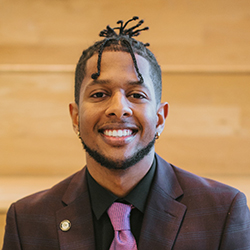 |
| Khayln Miller, M.S. AE '21 |
What is your next adventure?
I’ll be taking a month or two off to rest and set up logistics for my full-time job I’ll be starting in LA, at Boeing. I'll be a service engineer, working in their avionics and flight controls group. I’ll be working with different airliners to help solve their technical issues that go above their everyday maintenance engineering capabilities.
What about your next adventure are you most looking forward to?
I have had a lot of real-world experience from past internships and from research projects at Georgia Tech, so I'm looking forward to continuing to add experiences in the same domain. I grew up and went to undergrad in Ohio, so I’m looking forward to living on the west coast and getting a change of scenery.
Did you have any previous co-op, internship, or research experience in this area?
I have been fortunate to have internships dating back to high school starting off at the Air Force Base in Dayton, Ohio. During undergrad, I interned at Northrop Grumman and Boeing Commercial Airplanes, the latter where I learned how the business unit ran, specifically within the service engineering division. I also interned at Boeing Space and Launch where I worked on the actuation and deployment team.
At Tech, I was able to work in the Aerospace Systems Design Lab (ASDL) on sponsored research projects with the FAA, NASA, and the Georgia Tech Police Department (GTPD). With the FAA project, we worked on simulating supersonic aircraft data to look at how much noise new models could potentially produce at Mach 1.8. The NASA research was an electrified propulsion project to compare the current FAA regulations and identify any physical and functional gaps in improving the efficiency and safety for 2030 aircraft fleet. We analyzed the impact of carbon emissions and fuel burn and how electric propulsion would benefit a change in technology. For the GTPD project, we worked on their existing legacy technology platform and identified a methodology in which model-based systems engineering (MBSE) techniques can be used to allow stakeholders to quickly assess technology insertions and/or replacements into their technology platform.
How did your educational experience at Georgia Tech help you to achieve your goals?
Researching in the ASDL during the pandemic allowed me to experience the rigor and the skills needed to be successful in aerospace. Though it was mostly remote, it still allowed me to push myself and prepared me to join the workforce. On top of that, the skill sets I learned from class and techniques learned in the lab have been really helpful and built my confidence.
I feel like no matter where I work I'll always be a valuable asset to the organization, team, or company because I’ve learned how to really look at a problem and boil it down to a requirements-level to where I can start making realistic ways to solve the problem. I think just my mindset has changed as an engineer coming to Georgia Tech, and it's still evolving.
What advice would you give to an underclassman who would like to follow the same path?
First off, I would say, that everyone’s path is different, your path will be unique and no two paths are exactly the same. With that in mind, I would tell them to put their goals in concrete and their steps in the sand. Sand is compact and you might have to go in and change something around or you may need to have flexibility in your plan. I think it's important to have realistic goals and make sure you are open to opportunities because they will likely come your way, so don’t be afraid to take some calculated risks. For every opportunity that you don't take someone else will, so try and take chances.
Sabrina Noor, M.S. AE '21
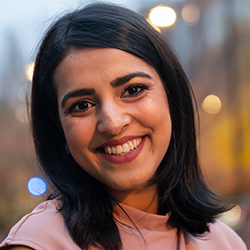 |
| Sabrina Noor, M.S. AE '21 |
What is your next adventure?
I’ll be moving to Ohio to work at GE Aviation as an aerospace engineer, focusing on aerodynamics. Before that, I hope to squeeze in as much fun before I start working full time.
What about your next adventure are you most looking forward to?
I’m really excited to start my new job and move to a new place. I live with my family, so I’m excited to furnish my own apartment, shop for a car, and really be my own person.
Did you have any previous co-op, internship, or research experience in this area?
I researched with Prof. Jerry Seitzman in the Ben T. Combustion Lab where we modeled alternative jet fuel for five different types of fuels and my part of the project was to vary different parameters and then see if it would hold up to a traditional jet fuel because the end goal would be to ideally replace jet fuel with this alternative fuel.
Working with Prof. Seitzman was a complete life changer because it gave me so much more self-confidence and a lot of value. Having a mentor that's been working in the field for more than 40 years and who values your opinion, walks you through problem solving, and forces you to think critically – it was a game changer for me.
After that project I did some research with Dr. Mark Costello, working on the urban wind energy project, where we set up different wind turbines and see which one would be ideal for an urban setting.
How did your educational experience at Georgia Tech help you to achieve your goals?
I feel like graduating from Georgia Tech has given me the opportunity to start over. I was walking down the street the other day and it hit me that I’m at a place I never thought I’d be. I’m from Pakistan and I transferred to Tech from Georgia State, so I’ve had my own set of obstacles studying aerospace. The challenges have been overwhelming at times, but I was able to find research and I was able to use that experience to achieve my goals. I’ve picked up so many tools and skills through research that it has set me up perfectly for my new job.
There are a lot of opportunities at Tech. Whether it’s through internships, research, or networking at the career fair, there are so many opportunities to find your career path.
What advice would you give to an underclassman who would like to follow the same path?
Keep pursuing your end goal and keep going. I’ve realized that if you keep working towards it, all the pieces will fall into place and it’s worth it. I have gotten so many things done that I didn’t think was possible by having that mindset. Even if it's a small thing like getting into a certain class, when it seems impossible just keep going for it and don’t be afraid to reach out to people who can help you.
Don’t stay silent. If a class isn't going too well seek advice, meet with an advisor, or talk to your professor, just stay invested in your goal and don’t stay silent.
Remember, everyday may not be good, but there’s something good in every day.
Samantha Corrado, Ph.D. AE '21
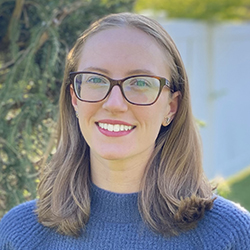 |
| Samantha Corrado, Ph.D. AE '21 |
What is your next adventure?
After graduation, I’m moving to Boston where I’ll start working as an applied scientist at Amazon Web Services (AWS). I’ll be working on applying machine learning techniques to improve their cybersecurity. I’m also getting married next June in Scottsdale, Arizona.
What about your next adventure are you most looking forward to?
I’m most excited to work in cyber security and developing machine learning solutions. I’m also excited to jump into a new field and learn all the new terminology and background the fundamentals and getting to apply the skills I’ve learned during my Ph.D. at Tech.
Did you have any previous co-op, internship, or research experience in this area?
I’ve been on quite a few different research projects which has given me a really diverse range of aerospace experience overall. I’m super grateful for the Aerospace Systems Design Lab (ASDL) for having such a wide array of research projects. I was on a project that involved modeling the U-2 aircraft and F-35 fleet sustainment and maintenance operations, another one that involved discrete event simulation, and another that used simulation to assess the impact of proposed technology improvements. We’d use this information to come up with an optimal portfolio of which technology improvement should be considered and which one has the greatest impact and warranted a large investment.
In the summer of 2018, I interned with Lockheed Martin where I focused on data fusion algorithm development at their Fort Worth, Texas location, specifically implementing Kalman filters for targeting tracking applications.
How did your educational experience at Georgia Tech help you to achieve your goals?
Tech was a very different experience compared to my undergraduate experience. Manhattan College where I received my bachelor’s degree didn’t have an aerospace school, it was mostly business, education, arts, and science, and had a very small engineering school. At Tech, one of the biggest differences besides the size, was the amount of opportunities. Here there are almost endless opportunities and with a big school, comes big research opportunities. I was exposed to so many different types of problems, facets of different problems, and the different methods to be applied to solve problems. That helped give me a better background to approach new problems because I’ve seen everything done and the different ways you can approach it. Tech is huge and has amazing research facilities so the diversity of research when you start your Ph.D. is impressive and helped me in so many ways.
What advice would you give to an underclassman who would like to follow the same path?
Get involved in research early, even if it’s something you think you might not enjoy at first. Try it out because every project you're on you gain new skills and you never know when those skills could be useful down the line. That was a big benefit of ASDL in general. I was on so many different research projects and so many different types of projects that I picked up skills that I thought at the time might not have been super relevant but ended up being so important in future job interviews.
Try your best to align with something you’re interested in but any research opportunity is a good research opportunity as long as you're gaining skills.
